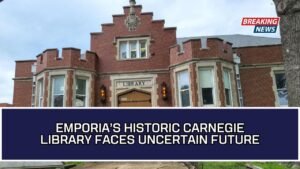In St. Louis, a concerning trend is emerging as doctors are noticing an increase in younger cancer patients, particularly those diagnosed with rare and aggressive cancers.
This has prompted healthcare professionals to look into potential environmental factors, specifically the proximity of certain neighborhoods to nuclear waste sites.
Dr. Gautum Agarwal, a urologic oncologist with Mercy, has been at the forefront of investigating this unusual pattern and is working to understand the connection between nuclear waste contamination and rising cancer rates among younger individuals.
The Story of Dre Bergeson
One of the most heartbreaking cases of this trend involves Dre Bergeson, a vibrant 37-year-old wife and mother, who was diagnosed with chromophobe renal cell carcinoma — a rare and aggressive form of kidney cancer.
Despite her resilience and optimism, Dre lost her battle with cancer on April 15, just months after her diagnosis.
Her story began in August when she started experiencing symptoms such as heartburn and pain. After a CT scan revealed a large mass on her kidney, Dre underwent surgery in October, with both her kidney and spleen being removed.
While she initially thought the cancer had been eradicated, her world was turned upside down just two weeks after her birthday.
The aggressive nature of her cancer shocked her family, as they were told she was diagnosed with a tumor that was highly uncommon in someone her age.
Darryl Bergeson, Dre’s husband, is now determined to raise awareness about the unusual circumstances surrounding her cancer and the possible link to nearby nuclear waste sites.
The Doctor’s Observation: A Trend Emerging in St. Louis
Dr. Gautum Agarwal, Dre’s doctor, has been seeing a rise in rare and aggressive cancers among young patients from specific areas, such as Coldwater Creek and Weldon Spring, both of which are known for their proximity to nuclear waste contamination.
He observed that these patients were often much younger and diagnosed with more rare and aggressive forms of cancer. This observation led him to take action.
Dr. Agarwal became the director of Precision Medicine with the goal of identifying high-risk individuals earlier through genomic testing and artificial intelligence.
By conducting a multi-cancer early detection screening, Dr. Agarwal has been able to spot potential cancer risks before they develop into more severe cases, offering hope for earlier treatment and better survival rates.
Multi-Cancer Early Detection: A New Hope
The ability to detect cancers at an early stage is proving to be transformative. A single blood sample is now capable of detecting multiple types of cancers, which significantly increases the chance of survival when treated early.
Dr. Agarwal emphasized that early detection could potentially cure cancers before they even form or at their earliest stages.
“If we can catch the cancer in its most precancerous stages, sometimes even in Stage 1, it can essentially be a cure,” said Dr. Agarwal. Unfortunately, Dre’s cancer was diagnosed too late for this life-saving intervention.
Environmental Testing and Concerns
The connection between cancer rates and environmental contamination in St. Louis is further complicated by the lack of extensive and ongoing environmental testing.
The Francis Howell School District, located near one of the affected areas, previously conducted third-party environmental testing several years ago.
However, the district has not carried out any additional tests since then, despite growing concerns from the community.
A statement from the district acknowledged that the testing met regulatory environmental standards, but many residents and experts, like Dr. Agarwal, believe further testing is necessary to understand the true impact of the nuclear waste on local health.
Areas with Higher Cancer Risks in St. Louis
| Area | Known Nuclear Waste Sites | Cancer Types Observed | Patient Age Group |
|---|---|---|---|
| Coldwater Creek | Coldwater Creek Site | Kidney cancer, lung cancer | Primarily young adults |
| Weldon Spring | Weldon Spring Disposal Site | Rare forms of kidney cancer | Children and adults |
| Nearby Communities | Shannon AFB Waste Site | Aggressive brain tumors, leukemia | Young adults, teens |
The trend of rising cancer rates among younger individuals living near nuclear waste sites in St. Louis is an alarming development that demands attention.
As doctors like Dr. Agarwal investigate these patterns, it’s clear that early cancer detection methods, such as multi-cancer screening, could save countless lives.
However, much more needs to be done, both in terms of environmental testing and public health awareness, to better understand the risks posed by these contaminated areas.
The Bergeson family is one of many affected by this issue, and through their tragedy, a call for action is being made.
It’s essential that residents of St. Louis and surrounding communities continue to advocate for further environmental studies and comprehensive healthcare solutions that can potentially reverse this alarming trend.




